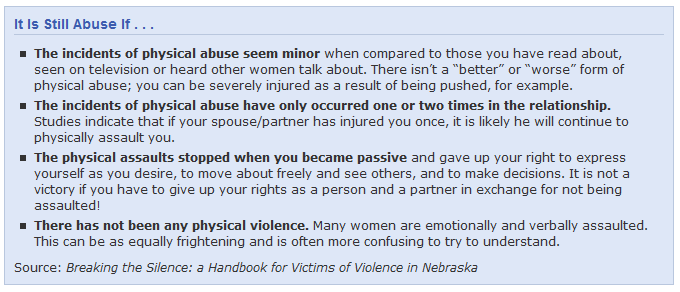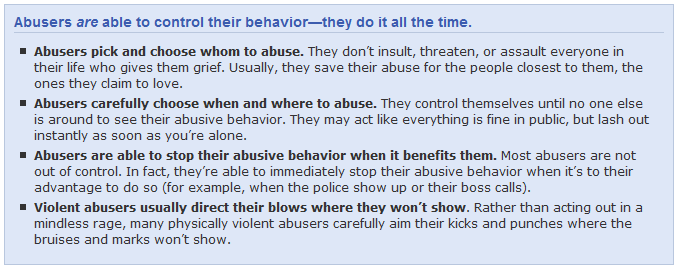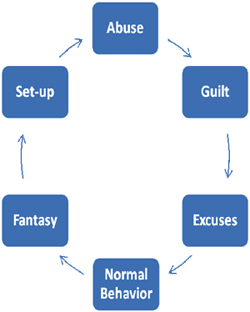On: 9 March, 2013
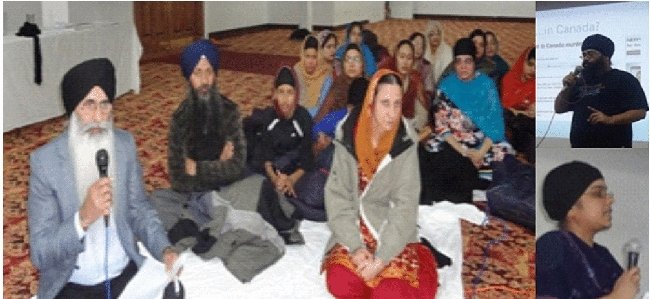
Over 50 attendees signed a memorandum as a symbol of perseverance for the struggle of couples in Sikh society. GGSSC- Canada held a seminar at Rexdale Sikh Spiritual Centre, Toronto on 'DOMESTIC VIOLENCE IN SIKH HOUSEHOLDS!'. The seminar was a received very positively by attendees, (mostly families). The event was not to provide solutions on domestic violence, but to share the doctrine for not letting domestic violence happen within Sikh families. The speakers Dr. Tarnjit Kaur and S. Amarpreet Singh took the attendees through the types of violence's, the need to avoid these and the possible solutions. There were different discussions around the following triggers such as:
- Communication lapse between couples
- Communication intervention by other relatives
- Speaking behind the Spouses back
- Being dishonest & Manipulating about anything
- Not being fair to each other
- Treating a spouse as inferior
- Mistreating spouse's family & others
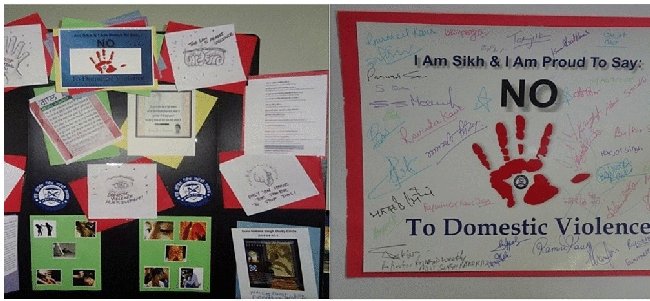 |
 |
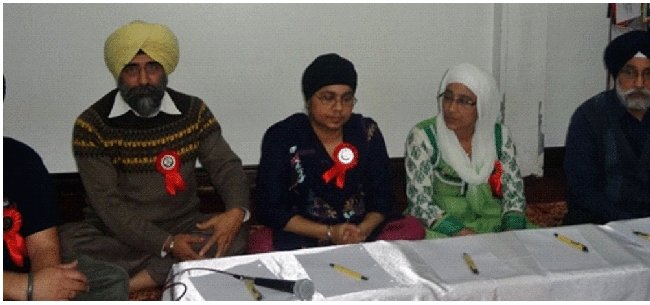 |
 |
The speakers shared a very simple notion that one should not cut the same branch of the tree you are standing on compared to you should not forego Sikh RehatMaryada based on which you are married as a couple. The basic message was to keep gurmat on the forefront as guidance and then address issues based on
"Hoye Ikatar Milo Mere Bhai, Dubidhaa Door Karo Liv Layee"
The seminar was very interactive with a breakout session and then a panel with questions from women and men.The Congregation praised the efforts of GGSSC- Canada and requested another seminar on parenting in light of gurmat.Even though it was the first seminar on domestic violence by GGSSC. Canada. The seminar was very well planned & taught me many things which I did not know said one of the attendees. . Another feedback we received fromanother attendee was that we should stop using foul language for women (bad-words).
The seminar was organized by GGSSC- Canada under the leadership of Bibi Dr. TarnjitKaur- Organizing Secretary for Women's Wing in Canada, Bibi Binder Kaur– Organizing Secretary for Public Wing and BibiSharanKaur- Organizing Secretary for Academic Services (Youth Wing). The introduction was given by S. Jagdish Singh- National General Secretary & welcomed by S. Amarpreet Singh National President-GGSSC- Canada. Others who attended were-, S.Satnam Singh- President Ontario, S. Jatinder Singh-Secretary Ontario, S.Bir Singh- President-Toronto, S. Parminder Singh- Finance Secretary, S. Ramandeep Singh- Gen Secy Toronto, Bibi Simi Kaur, BibiSimranKaur,BibiRavinderKaur, S. Sukhdeep Singh, S.Paramjit Singh- Secy- Guelph Wing,BibiRanjitKaur-Secy of Kirtan& music Waterloo Wing, S. Gursharan Singh- Special initiatives and the youth volunteers.BibiSharamKaur president of Youth Wingdid remarkable seva on handling the others children's while the parents were attending the seminar.
---------------------------------
|
About: Domestic violence Domestic violence, also known as domestic abuse, spousal abuse, battering, family violence, and intimate partner violence (IPV), is a pattern of behavior which involves the abuse by one partner against another in an intimate relationship such as marriage, cohabitation, dating or within the family.[1] Domestic violence can take many forms, including physical aggression or assault (hitting, kicking, biting, shoving, restraining, slapping, throwing objects, battery), or threats thereof; sexual abuse; emotional abuse; controlling or domineering; intimidation; stalking; passive/covert abuse (e.g., neglect); and economic deprivation.[1][2] Alcohol consumption[3] and mental illness[4] can be co-morbid with abuse, and present additional challenges in eliminating domestic violence. Awareness, perception, definition and documentation of domestic violence differs widely from country to country, and from era to era. Domestic violence and abuse is not limited to obvious physical violence. Domestic violence can also mean endangerment, criminal coercion, kidnapping, unlawful imprisonment, trespassing, harassment, and stalking.[5] Laws on domestic violence vary by country. While it is generally outlawed in the Western World, this not the case in many developing countries. In Russia there is no law specifying domestic violence as a crime, even though physical violence is illegal.[6]For instance, in 2010, the United Arab Emirates's Supreme Court ruled that a man has the right to physically discipline his wife and children as long as he doesn't leave physical marks.[7] The social acceptability of domestic violence also differs by country. While in most developed countries domestic violence is considered unacceptable by most people, in many regions of the world the views are different: according to a UNICEF survey, the percentage of women aged 15–49 who think that a husband is justified in hitting or beating his wife under certain circumstances is, for example: 90% in Jordan, 85.6% in Guinea, 85.4% in Zambia, 85% in Sierra Leone, 81.2% in Laos, 81% in Ethiopia.[8] |
---------------------------------
|
Domestic Violence and Abuse Signs of Abuse and Abusive Relationships http://www.helpguide.org/mental/domestic_violence_abuse_types_signs_causes_effects.htm
Understanding domestic violence and abuse
Domestic violence and abuse are used for one purpose and one purpose only: to gain and maintain total control over you. An abuser doesn’t “play fair.” Abusers use fear, guilt, shame, and intimidation to wear you down and keep you under his or her thumb. Your abuser may also threaten you, hurt you, or hurt those around you. Domestic violence and abuse does not discriminate. It happens among heterosexual couples and in same-sex partnerships. It occurs within all age ranges, ethnic backgrounds, and economic levels. And while women are more commonly victimized, men are also abused—especially verbally and emotionally, although sometimes even physically as well. The bottom line is that abusive behavior is never acceptable, whether it’s coming from a man, a woman, a teenager, or an older adult. You deserve to feel valued, respected, and safe. Recognizing abuse is the first step to getting help Domestic abuse often escalates from threats and verbal abuse to violence. And while physical injury may be the most obvious danger, the emotional and psychological consequences of domestic abuse are also severe. Emotionally abusive relationships can destroy your self-worth, lead to anxiety and depression, and make you feel helpless and alone. No one should have to endure this kind of pain—and your first step to breaking free is recognizing that your situation is abusive. Once you acknowledge the reality of the abusive situation, then you can get the help you need. Signs of an abusive relationship There are many signs of an abusive relationship. The most telling sign is fear of your partner. If you feel like you have to walk on eggshells around your partner—constantly watching what you say and do in order to avoid a blow-up—chances are your relationship is unhealthy and abusive. Other signs that you may be in an abusive relationship include a partner who belittles you or tries to control you, and feelings of self-loathing, helplessness, and desperation. To determine whether your relationship is abusive, answer the questions below. The more “yes” answers, the more likely it is that you’re in an abusive relationship.
When people talk about domestic violence, they are often referring to the physical abuse of a spouse or intimate partner. Physical abuse is the use of physical force against someone in a way that injures or endangers that person. Physical assault or battering is a crime, whether it occurs inside or outside of the family. The police have the power and authority to protect you from physical attack. Sexual abuse is a form of physical abuse Any situation in which you are forced to participate in unwanted, unsafe, or degrading sexual activity is sexual abuse. Forced sex, even by a spouse or intimate partner with whom you also have consensual sex, is an act of aggression and violence. Furthermore, people whose partners abuse them physically and sexually are at a higher risk of being seriously injured or killed.
Emotional abuse: It’s a bigger problem than you think When people think of domestic abuse, they often picture battered women who have been physically assaulted. But not all abusive relationships involve violence. Just because you’re not battered and bruised doesn’t mean you’re not being abused. Many men and women suffer from emotional abuse, which is no less destructive. Unfortunately, emotional abuse is often minimized or overlooked—even by the person being abused. Understanding emotional abuse The aim of emotional abuse is to chip away at your feelings of self-worth and independence. If you’re the victim of emotional abuse, you may feel that there is no way out of the relationship or that without your abusive partner you have nothing. Emotional abuse includes verbal abuse such as yelling, name-calling, blaming, and shaming. Isolation, intimidation, and controlling behavior also fall under emotional abuse. Additionally, abusers who use emotional or psychological abuse often throw in threats of physical violence or other repercussions if you don’t do what they want. You may think that physical abuse is far worse than emotional abuse, since physical violence can send you to the hospital and leave you with scars. But, the scars of emotional abuse are very real, and they run deep. In fact, emotional abuse can be just as damaging as physical abuse—sometimes even more so.
Violent and abusive behavior is the abuser’s choice Despite what many people believe, domestic violence and abuse is not due to the abuser’s loss of control over his or her behavior. In fact, abusive behavior and violence is a deliberate choice made by the abuser in order to control you. Abusers use a variety of tactics to manipulate you and exert their power:
The cycle of violence in domestic abuse Domestic abuse falls into a common pattern, or cycle of violence:
Your abuser’s apologies and loving gestures in between the episodes of abuse can make it difficult to leave. He may make you believe that you are the only person who can help him, that things will be different this time, and that he truly loves you. However, the dangers of staying are very real.
Recognizing the warning signs of domestic violence and abuse It's impossible to know with certainty what goes on behind closed doors, but there are some telltale signs and symptoms of emotional abuse and domestic violence. If you witness any warning signs of abuse in a friend, family member, or co-worker, take them very seriously. General warning signs of domestic abuse People who are being abused may:
People who are being physically abused may:
Warning signs of isolation People who are being isolated by their abuser may:
The psychological warning signs of abuse People who are being abused may:
Speak up if you suspect domestic violence or abuse If you suspect that someone you know is being abused, speak up! If you’re hesitating—telling yourself that it’s none of your business, you might be wrong, or the person might not want to talk about it—keep in mind that expressing your concern will let the person know that you care and may even save his or her life.
Adapted from: NYS Office for the Prevention of Domestic Violence Talk to the person in private and let him or her know that you’re concerned. Point out the things you’ve noticed that make you worried. Tell the person that you’re there, whenever he or she feels ready to talk. Reassure the person that you’ll keep whatever is said between the two of you, and let him or her know that you’ll help in any way you can. Remember, abusers are very good at controlling and manipulating their victims. People who have been emotionally abused or battered are depressed, drained, scared, ashamed, and confused. They need help to get out, yet they’ve often been isolated from their family and friends. By picking up on the warning signs and offering support, you can help them escape an abusive situation and begin healing. ............more | ||||||||||||||||||||||||||||||||||

 Domestic violence and abuse can happen to anyone, yet the problem is often overlooked, excused, or denied. This is especially true when the abuse is psychological, rather than physical. Noticing and acknowledging the signs of an abusive relationship is the first step to ending it. No one should live in fear of the person they love. If you recognize yourself or someone you know in the following warning signs and descriptions of abuse, reach out. There is help available.
Domestic violence and abuse can happen to anyone, yet the problem is often overlooked, excused, or denied. This is especially true when the abuse is psychological, rather than physical. Noticing and acknowledging the signs of an abusive relationship is the first step to ending it. No one should live in fear of the person they love. If you recognize yourself or someone you know in the following warning signs and descriptions of abuse, reach out. There is help available.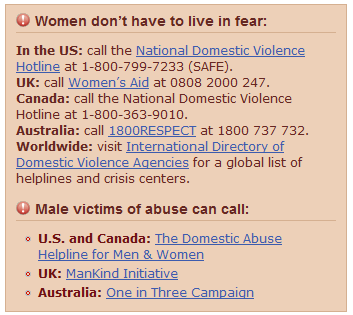 Domestic abuse, also known as spousal abuse, occurs when one person in an intimate relationship or marriage tries to dominate and control the other person. Domestic abuse that includes physical violence is called domestic violence.
Domestic abuse, also known as spousal abuse, occurs when one person in an intimate relationship or marriage tries to dominate and control the other person. Domestic abuse that includes physical violence is called domestic violence.